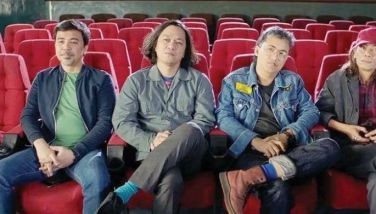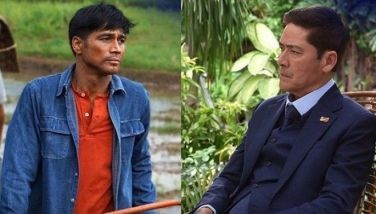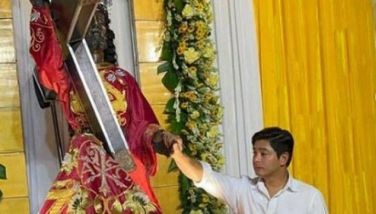Waiting for Dondi Ledesma - PLAYBACK by Juaniyo Arcellana
January 9, 2001 | 12:00am
The enigmatic bassist Dondi Ledesma came out with his seventh independently produced album in early 2000, Die Black Rat, with all instruments and vocals by the Ilonggo wunderkind who, admittedly, is not so young. The bigger news, however, has to do with the album Ledesma is currently working on in his Pasay home studio, right behind Trader’s Hotel, with the hardy Pinoy rock and roll veteran Pepe Smith and journeyman guitarist Jun Lopito. But more on this later.
Ledesma, who grew up in Iloilo, has become something of a legend in Manila circles, where his Ilonggo friends push his music, his reputation spreading both by word of mouth and passed-on CDs, sounding none the worse for wear despite several rounds in different CD players of varying makes and models.
He is well-remembered for his performance at the 1999 NU Rock Awards, where he played bass in the all-star jam finale that featured then newly inducted hall of fame drummer Edmund Fortuno in one of his last public performances before his death.
As for Die Black Rat, our first exposure to Ledesma in relevant form, we get ample evidence of the bassist’s musical virtuosity, adept as he is in sundry instruments, such as flute and keyboards.
And apart from the drum programs that often sound like the crash of an advancing army, Ledesma non-chalantly states in the sparse liner notes: No lead guitars. What?! Repeated though abbreviated listenings –my copy occasionally skips and hangs –would have us swear that there was a lead guitar somewhere in the mix, but no, we are assured by Ledesma’s Ilonggo agents that what we’re hearing is actually is a six-string piccolo bass, an instrument seldom heard hereabouts.
So there ensues a mad scramble on how to describe, or maybe vainly label, the enigmatic man’s music: fusion? new age metal? postmodern jazz?
But that could be the least of Ledesma’s concerns. Listening to Die Black Rat one rainy noon, chased with some beer and smokes, would reveal the following observations: that there are similarities with the ’70s and ’80s improvisational rock groups Yes and Rush, particularly in the precision playing and the high-pitched, ethereal vocals that are like a tribute to Yes vocalist Jon Anderson.
Like the best bassists before him, Ledesma is never content in staying within the parameters of a specific musical form, so that his experiments with shifting time signatures recall the bebop giants, and the blazing lead guitar lines on the piccolo bass are a manifestation of a metal temperament.
That all songs are composed, arranged, performed, recorded and engineered by Ledesma himself –indeed a one-man wrecking crew –all the more makes Die Black Rat impressive, and practically puts him in the league of similar virtuosos like Prince, Stevie Wonder and Quincy Jones, incidentally all black men.
As usual his provincemates are in a quandary how to sell his music since it is basically "un-commercial," meaning you never know if the artist will just be laying out a purely instrumental cut or just as suddenly take up the vocal chores.
Maybe you can file him under "hard-to-find."
Now to the worst kept secret in town: the album Ledesma is doing with Smith and Lopito. According to our Western Visayan and Pasay sources, the forthcoming CD will be one to watch out for, with all tracks composed and most instruments played by Ledesma, with Smith on vocals and Lopito on the occasional guitar. Producer is said to be "anak ni Jullie Yap-Daza."
Problem is, will we ever get to hear the final finished product? The same sources said that the cuts are great, but only five have been finished in the past six months, or an average of less than one track a month.
Smith’s singing is as driven and unpredictable as ever: "If you didn’t know it was Smith, you‘d swear it was an American singing," said one kibitzer who has spent time in Ledesma’s studio.
There are times too when Smith is said to suddenly stop in mid-verse, abruptly cutting the recording session. At the rate they’re going, it will take another six months before the album is finally through, or by mid-2001.
But judging from the early rave reviews and previews, it should be well worth the sullen wait.
Ledesma, who grew up in Iloilo, has become something of a legend in Manila circles, where his Ilonggo friends push his music, his reputation spreading both by word of mouth and passed-on CDs, sounding none the worse for wear despite several rounds in different CD players of varying makes and models.
He is well-remembered for his performance at the 1999 NU Rock Awards, where he played bass in the all-star jam finale that featured then newly inducted hall of fame drummer Edmund Fortuno in one of his last public performances before his death.
As for Die Black Rat, our first exposure to Ledesma in relevant form, we get ample evidence of the bassist’s musical virtuosity, adept as he is in sundry instruments, such as flute and keyboards.
And apart from the drum programs that often sound like the crash of an advancing army, Ledesma non-chalantly states in the sparse liner notes: No lead guitars. What?! Repeated though abbreviated listenings –my copy occasionally skips and hangs –would have us swear that there was a lead guitar somewhere in the mix, but no, we are assured by Ledesma’s Ilonggo agents that what we’re hearing is actually is a six-string piccolo bass, an instrument seldom heard hereabouts.
So there ensues a mad scramble on how to describe, or maybe vainly label, the enigmatic man’s music: fusion? new age metal? postmodern jazz?
But that could be the least of Ledesma’s concerns. Listening to Die Black Rat one rainy noon, chased with some beer and smokes, would reveal the following observations: that there are similarities with the ’70s and ’80s improvisational rock groups Yes and Rush, particularly in the precision playing and the high-pitched, ethereal vocals that are like a tribute to Yes vocalist Jon Anderson.
Like the best bassists before him, Ledesma is never content in staying within the parameters of a specific musical form, so that his experiments with shifting time signatures recall the bebop giants, and the blazing lead guitar lines on the piccolo bass are a manifestation of a metal temperament.
That all songs are composed, arranged, performed, recorded and engineered by Ledesma himself –indeed a one-man wrecking crew –all the more makes Die Black Rat impressive, and practically puts him in the league of similar virtuosos like Prince, Stevie Wonder and Quincy Jones, incidentally all black men.
As usual his provincemates are in a quandary how to sell his music since it is basically "un-commercial," meaning you never know if the artist will just be laying out a purely instrumental cut or just as suddenly take up the vocal chores.
Maybe you can file him under "hard-to-find."
Now to the worst kept secret in town: the album Ledesma is doing with Smith and Lopito. According to our Western Visayan and Pasay sources, the forthcoming CD will be one to watch out for, with all tracks composed and most instruments played by Ledesma, with Smith on vocals and Lopito on the occasional guitar. Producer is said to be "anak ni Jullie Yap-Daza."
Problem is, will we ever get to hear the final finished product? The same sources said that the cuts are great, but only five have been finished in the past six months, or an average of less than one track a month.
Smith’s singing is as driven and unpredictable as ever: "If you didn’t know it was Smith, you‘d swear it was an American singing," said one kibitzer who has spent time in Ledesma’s studio.
There are times too when Smith is said to suddenly stop in mid-verse, abruptly cutting the recording session. At the rate they’re going, it will take another six months before the album is finally through, or by mid-2001.
But judging from the early rave reviews and previews, it should be well worth the sullen wait.
BrandSpace Articles
<
>
- Latest
- Trending
Trending
Latest
Trending
Latest
Recommended
January 10, 2025 - 12:00am































